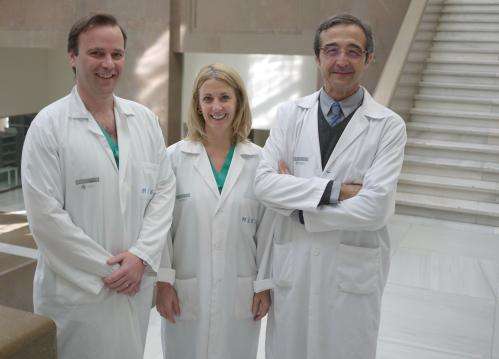Research progresses on reduction of lung injuries caused by mechanical breathing

The Faculty of Medicine and Dentistry of the Universitat de València is participating in pioneering research to advance the prevention of lung damage from mechanical ventilation in operations that require general anaesthesia. Professor Javier Belda and Dr. Carlos Ferrando have led experimental work that shows for the first time the utility of the stress index to adjust artificial ventilation supply in real time in order to avoid lung injuries. The results of this work are being published this week in the magazine Critical Care.
The research led by Belda and Ferrando uses a pioneering technique of indexing of stress. "When artificial breathing is applied, there are two parameters to avoid damaging the lung: the amount of gas volume (oxygen plus air), and positive pressure applied to prevent the lung from collapsing. So far, this indicator is only used to the pressure that prevented the collapse," Belda says. However, as Ferrando points out, "We have verified that it is much more efficient to regulate positive pressure with other parameters of respiratory mechanics and reserve the stress index to indicate the necessary volume of gas that prevents lung is injury."
This work has been conducted over a period of two years through experimenting with animals in the laboratories of the Faculty of Medicine and Dentistry of the Universitat de València. Recently, researchers have also conducted tests of this new application of the stress index in healthy patients during surgical operations.
Scientific literature shows that lung complications, more or less severe, occur in up to 30 to 40% of patients who have been given artificial ventilation. "While these often have no impact in the long-term, it can lead to increased hospitalization days, use of resources, and therefore an increase in health spending," Ferrando says.
Meanwhile, the research coordinator of the anaesthesiology service at the Clinical Hospital, Marina Soro, says these results "conclude experimental work that we started over ten years ago, a period in which our laboratory at the Mixed Unit of Research has advanced to study any model, from cells to large animals."
More information: Ferrando C, Suárez-Sipmann F, Gutierrez A, Tusman G, Carbonell J, García M,Piqueras L, Compañ D, Flores S, Soro M, Llombart A, Belda F. "Adjusting tidal volume to stress index in an open lung condition optimizes ventilation and prevents overdistension in an experimental model of lung injury and reduced chest wall compliance." Crit Care. 2015 Jan 13;19(1):9. [Epub ahead of print] PubMed. PMID: 25583125.















